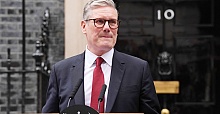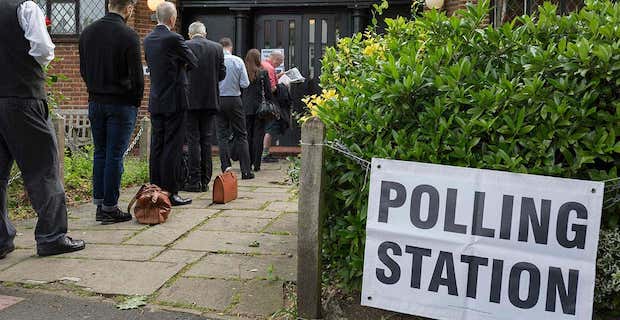The 2019 U.K. general election is proving to be one of the most volatile and difficult to predict in modern British history, according to local media and pollsters. This is due both to the ongoing polarization of Brexit and the rising trend of tactical voting. Tactical voting is where a person votes for a party or candidate who is not their first choice but stands the best chance of beating the party or candidate who they least want to win.
This can be aided by electoral pacts between parties and candidates, who might withdraw from certain seats in order to beat a particular party or candidate.
In the U.K., the centrist Liberal Democrats, the environmentalist Green Party and the Welsh nationalist Plaid Cymru – all pro-Remain parties – have agreed not to run in certain seats in order to boost their chances of defeating center-right, pro-Brexit Conservative candidates.
On the other side of the political spectrum, the right-wing Brexit Party has agreed not to stand in the 317 seats the Conservative Party won in the last election.
The center-left Labour party, the main opposition party, has not entered into a pact with any other party.
There are a number of tactical voting websites, mostly focused on how to boost pro-Remain MPs. But they disagree on which party to vote for due to differences in their polling data, further complicating matters.
The U.K. uses a ‘first-past-the-post’ electoral system, where the candidate with the highest number of votes wins that particular seat. This means an MP does not need more than 50% of the vote to win a seat and that a party with a large share of the national vote but that comes second in the majority of the seats it contests is not rewarded with seats in parliament.
The Electoral Reform Society (ERS), which campaigns for changing the electoral system, carried out a poll that found 24% of people intend to vote tactically to keep out the candidate they dislike the most, rather than vote for the candidate they most agree with. This is an increase from 20% in 2017.
In a statement, the ERS said: “ERS analysis of the 2017 election also found that 68% of votes had no impact on the result – 22 million votes went to waste. It also found that just 0.0016% of voters choosing differently would have given the Conservatives a majority…The U.K. remains the only country in Europe to use First Past the Post – where only one candidate wins in each area, and all other votes go to waste – for its main elections.”
David Hughes, chief executive of the ERS said: “For too long, First Past the Post has skewed our elections beyond recognition, piling up wasted votes and forcing people to make tactical choices at the ballot box, depriving them of voting for the party that most accurately represents their views.
“If we had a fair, proportional voting system – as in Scotland and most of the developed world – this problem simply wouldn’t exist: you can vote for who you want, and if your first choice doesn’t stand a chance, your second choice is counted instead.”
The British Election Study (BES) said this year’s election will be highly unpredictable as party loyalties have weakened due to Brexit, which has divided both the country and the two major political parties: the Conservatives and Labour.
The BES, which analyzes election patterns, says that this year’s election will be “extremely difficult to accurately predict” due to electoral shocks including Brexit, immigration and long-term effects of the 2008 global financial crisis.
“Both the 2015 and 2017 General Elections saw more people change their vote than ever before, with nearly half the country (49%) voting for different parties across the three elections from 2010-17,” the group said in a statement, adding this was “an historic trend in which voters have become less loyal or partisan.”
The BES said the last election in 2017 “saw the highest levels of switching between the Conservatives and Labour since the BES started in 1964.”
A British party needs 326 seats out of the 650 seats in parliament to form a majority, and polls have pointed to a Conservative majority in parliament. However, pro-Remain tactical voting websites have said that tactical voting in around just 50-60 seats could deprive the Conservatives of a majority altogether, as the ruling party won these seats by slim margins that could be overturned were the pro-Remain parties to unite.
In order for them to unite, however, they must first know which candidate to back, which in turn relies on accurate polling, which for the reasons above has proven more difficult to obtain than in previous elections.
Voters in the U.K. go to the polls on Dec. 12.


 Prime Minister Keir Starmer's 2025 Easter message
Prime Minister Keir Starmer's 2025 Easter message After Nesil Caliskan a by-election will be held in Jubilee ward in Enfield
After Nesil Caliskan a by-election will be held in Jubilee ward in Enfield Publishing the analysis, Labour’s Cllr Ergin Erbil said Everybody in Enfield deserves basic rights
Publishing the analysis, Labour’s Cllr Ergin Erbil said Everybody in Enfield deserves basic rights Gaza-Israel conflict Statement from Cllr Ergin Erbil, Leader of Enfield Council
Gaza-Israel conflict Statement from Cllr Ergin Erbil, Leader of Enfield Council The European Union called on Turkey to uphold democratic values
The European Union called on Turkey to uphold democratic values Turkish citizens in London said Rights, Law, Justice
Turkish citizens in London said Rights, Law, Justice The Council of Turkish Cypriot Associations Geneva response letter
The Council of Turkish Cypriot Associations Geneva response letter Sustainable Development and ESG, Will This Become the Course for Turkic World
Sustainable Development and ESG, Will This Become the Course for Turkic World The 'Prince of Paris' has impressed in his first EuroLeague season
The 'Prince of Paris' has impressed in his first EuroLeague season Saran Media And Euroleague Basketball Extend Media Rights Partnership for Four More Years
Saran Media And Euroleague Basketball Extend Media Rights Partnership for Four More Years Will Rangers be Jose Mourinho’s next victim?
Will Rangers be Jose Mourinho’s next victim? Jose Mourinho's Fenerbahce face Rangers on Thursday
Jose Mourinho's Fenerbahce face Rangers on Thursday Barclays has become the biggest UK lender so far to cut mortgage rates
Barclays has become the biggest UK lender so far to cut mortgage rates THE SPRING STATEMENT EXPLAINED, UK ECONOMIC OUTLOOK AND GROWTH FORECASTS
THE SPRING STATEMENT EXPLAINED, UK ECONOMIC OUTLOOK AND GROWTH FORECASTS Launch of Made in Enfield gift shop to celebrate local artists and designers
Launch of Made in Enfield gift shop to celebrate local artists and designers Trial used smart Wi-Fi sensors for live building occupancy data to optimise
Trial used smart Wi-Fi sensors for live building occupancy data to optimise
















